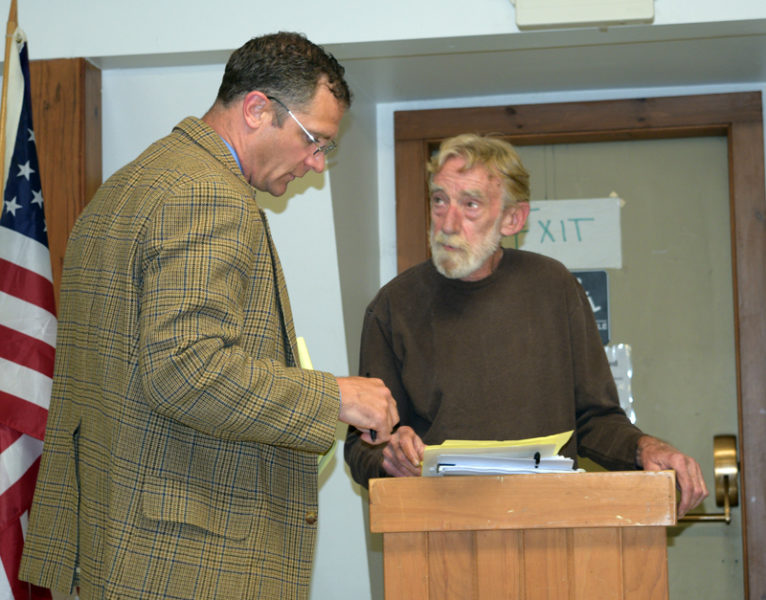
Attorney Benjamin J. Smith (left) confers with his client Ralph Hilton during Hilton’s presentation at an ethics hearing involving Alna First Select Board member Ed Pentaleri Thursday, June 8. Hilton filed the complaint April 27, accusing Penatleri of a conflict of interest, bias, and perjury. (Sherwood Olin photo)
Agreeing Ed Pentaleri’s actions as a private citizen were enough to create an appearance of bias, the two remaining members of the Alna Select Board voted to recuse Alna’s First Select Board member from participating in litigation related to a controversial boat ramp.
The board’s vote came at the end of a contentious three-hour, 45-minute ethics hearing that drew a near 50-person crowd to the meeting room of the Alna fire station on Thursday, June 8.
In discussion before taking the vote, Alna Second Select Board member Steven Graham and Third Select Board member Coreysha Stone said they did not personally feel Pentaleri actually acted with bias, but his actions could be construed as biased and therefore merited his recusal.
“I found that there were things that were done that could arguably be used to argue bias or conflict, but I was not convinced that substantively they were,” Graham said.
“I think really it does Ed a favor, honestly,” Stone said. “I think at this point we need a fresh chapter in this long saga and this chapter will have your face and my face on it and we should follow what this says, to not include Ed on any of the decision making, so it’s real cut and clean moving forward.”
The hearing was prompted by a formal complaint filed April 27 by Alna resident Ralph Hilton. Hilton alleged Pentaleri did not disclose a conflict of interest, allowed bias to affect his decisions, and committed perjury in a court document, all of which violated Alna’s Code of Ethics and Conduct policy, which the town adopted in August 2022.
Both Hilton and Pentaleri were allowed 40 minutes to make their case to the board. Following their presentations members of the public were allowed three minutes each to address the issue.
“I brought this complaint because I believe, I believe he violated this ethics policy,” Hilton said in his conclusion. “I’ll believe that when I go sit down and when I go out the door.”
In a point by point rebuttal of the six points made in Hilton’s written complaint, Pentaleri argued Hilton’s allegations were incorrect, inaccurate, or

Alna First Select Board member Ed Pentaleri awaits his turn to speak during a ethics hearing Thursday, June 8. Agreeing Pentaleri’s actions could arguably contribute to a perception of bias, Pentaleri’s fellow board members ultimately voted to recuse him from further participation in litigation involving Golden Ridge Road resident Jeff Spinney. (Sherwood Olin photo)
did not apply. The proper venue for perjury complaint is the court, Pentaleri said, and other positions or statements Hilton attributed to him amounted to hearsay.
“If Ralph disagrees with a policy position that I’ve taken, the proper thing for him to do is first, give me a call and we can talk about ideas that we disagree about,” Pentaleri said. “He can oppose my reelection. He can run to be elected himself. Now he can pursue my recall. None of this is addressed through an ethics complaint.”
Although Hilton’s complaint prompted the June 8 hearing, the allegations relate to an ongoing legal case between the town and Golden Ridge Road resident Jeff Spinney. At issue is a private boat ramp Spinney installed on his property accessing the Sheepscot River in December 2020. The town is currently pursuing land use enforcement action against Spinney for violation of the town’s shoreland ordinance. Spinney is countersuing the town seeking to overturn the board of appeals’ decision regarding his project.
Graham, a retired attorney, said the board opted not to have the town’s attorney present, choosing to conduct the hearing in a less formal fashion than a legal hearing.
“We decided this hearing should not be a trial with all the procedural stuff that is overlaid on those things, but that we should be able to sort through the complaint Ralph filed,” Graham said.
Hilton presented 10 exhibits that he said illustrated evidence of Pentaleri’s bias, conflict of interest, and dishonesty.
Hilton’s exhibits included documentation of the Sheepscot River Legal Defense Fund webpage and related post office box, both of which Hilton alleged were controlled by Pentaleri.
Other exhibits included excerpts from the 2022 and 2023 town reports showing increased legal fees; invoices from the town’s law firm, Drummond Woodsum; copies of email communications between private citizen Pentaleri and town officials, various Pentaleri letters to local newspapers, a Pentaleri signed agreement to participate in mediation; an affidavit in which Pentaleri allegedly perjured himself, a letter from Spinney’s attorney citing those alleged perjurious statements, and an April 19 court ruling including Pentaleri as an interested party to be included in legal filings.
“Mr. Pentaleri has demonstrated that he’s not doing this for the benefit of the town, just for his personal revenge and putting us all through this,” Hilton said. “Because of these ethical violations, it’s not ethical … to rob the town of money to further his desire to stop Mr. Spinney from doing what he’s doing.”
In his response, Pentaleri disputed the Hilton’s allegation that Pentaleri’s inappropriate behavior cost the town $100,000 in legal fees. According to Pentaleri’s calculations, between Nov. 10, 2021 and April 30, 2023, $73,142 has been spent on legal fees; $68,799 of which has been accrued since Pentaleri’s election in December 2021.
Pentaleri said his affidavit was true and correct to his knowledge, saying he disputed Spinney’s claim that Spinney’s boat ramp was a legal non-conforming use, claiming it was constructed prior to the adoption of the Alna’s shoreland ordinance and remained in continuous use. Abutters to the Spinney property did not support that claim, Pentaleri said
Pentaleri noted Alna’s ethics policy regarding conflict of interest specified financial interest, and asserted he had none. Alna’s ethics policy standard of bias requires recusal when a subject’s personal feelings prevent them from making an impartial decision.
Pentaleri argued that did not apply as he was not making a personal judgment. His role as a select board member was ministerial, not quasi-judicial, he said.
“I am not interpreting the law,” he said. “I am making a black-and-white decision. Is there a violation of a final ruling of the planning or the board of appeals or is there not a violation.”
Pentaleri pointed out the Nov. 10, 2021 decision to begin enforcement action against Spinney was made by a previous select board. Since he has been on the select board the sole Spinney issue he has participated in was April 28 decision to appeal the April 19 Superior Court ruling to the Maine Supreme Court.
Pentaleri acknowledged he created the Sheepscot River Legal Defense Fund and opened the post office box for it, but he said he controlled neither. Pentaleri said the website was just one of the several he has made for local organizations since moving to town, including one for Jeff Spinney, and argued creating a website is not evidence of a vested interest.
Pentaleri disputed Hilton’s characterization of his public statements, letters, and emails, saying his comments were primarily directed at town officials, urging them to accurately and transparently apply the town’s ordinances.
Pentaleri said he counted 69 references to him in the 110 pages of legal invoices through April 30. Of those mentions, 15 relate to the Spinney case, Pentaleri said, adding his role as first select board member often means he is the point of contact for the board.
The town is accruing legal costs because it is enforcing the town’s shoreland zoning ordinance, Pentaleri said. Failure to enforce town ordinances could open the town to lawsuits from residents or the state.
“I think it is in the best interests of the town that we do our jobs,” Pentaleri said. “I also think that it is in the best interest of the town not to set the precedent that our ordinances only apply to people who do not put up a fight, or they don’t apply to anyone who has the wealth to fight them in court.”



